George and Phoebe Apperson Hearst
AMERICAN INDUSTRIALISTS, TYCOONS

“Surplus wealth is a sacred trust which its possessor
is bound to administer in his lifetime for the good of the community.”
—Andrew Carnegie
George and Phoebe Apperson Hearst became famously wealthy from business interests from coast to coast. They made their fame in California, but both had their roots right here in Missouri, Their namesake continues today, thanks in part to the fame of their newspaper son, William Randolph Hearst.
THE EARLY YEARS
George Hearst was born and raised in Franklin County on September 3, 1820, one year before Missouri became a state. He was said to be illiterate but still managed to graduate from the Franklin County Mining School at the age of 18. His poor scholastic work was overshadowed by his ability to read the land and find treasures buried beneath it. After he graduated from school, he worked in numerous mines across the state and even owned a general store in Judith Springs, which now just a spot along the road near Union.

Phebe (later changed to Phoebe) Apperson was born on December 3, 1842, near the town of St. Clair. The small town girl attended schools in St. Clair, Steelville, and St. James. Legend has it that when she was just a small girl, George Hearst—a man twenty-two years her senior—moved next door to the family. He left for the California gold rush a short time later, while she became a teacher at a school near the present-day Meramec State Park.
RISE TO FAME

Hearst struck it rich as a gold prospector and returned to Missouri a very wealthy man. He moved back to Missouri primarily to take care of his dying mother. But when he moved, the now 42-year-old man reunited with the young girl, Phebe, who was now around 20-years old. The two fell in love and were married in 1862. Their first and only child, William Randolph Hearst, was born ten months later.
The couple moved to San Francisco while Phoebe was pregnant, primarily so that George could expand his business interests. He began making money at a rapid pace in the Golden State and made them one of the most affluent couples of the era. Their wealth allowed Phoebe to take their son on lavish trips to Europe, where young William developed the ideas for his famous Hearst Castle.
SHOW ME SUCCESS

Courtesy of Library of Congress
George Hearst, ever a mover and shaker, was never one to rest on his work ethic, or on his enormous amount of money. The next step for him was to turn his success in gold prospecting into success in other business ventures and in politics. He took a giant step forward when a fellow business associate defaulted on a loan to Hearst, which gave the family control of the San Francisco Examiner. This paved the way for his son to eventually dominate the publishing industry. With wealth already assured, George turned his attention to politics, as he won a position on the California State Assembly in 1865, but he lost a bid to become governor in 1882. He eventually gained a seat in the U.S. Senate in 1887 and served in that capacity until he died four years later.
Phoebe filled the role as wealthy wife quite well. While in California, she gave large amounts of money to a number of education and arts charities. When her husband was appointed to the Senate, she continued her philanthropic works in Washington, D.C. She was still only 49 years old when George died, and inherited a fortune estimated at $17 million. ($750-million in today’s value) The remainder of her life was spent helping out causes near to her heart, while also helping her son become one of the largest publishers in U.S. history. Phoebe died in 1919, being called one of California’s greatest women in history.
EXTRA, EXTRA!

- Phoebe signed a prenuptial contract when the couple married in 1862.
- George and Phoebe Apperson Hearst were major contributors to the restoration of George Washington’s home in Mount Vernon.
- Phoebe was the first woman regent of the University of California.
- George was appointed to the U.S. Senate after the death of John F. Miller.

